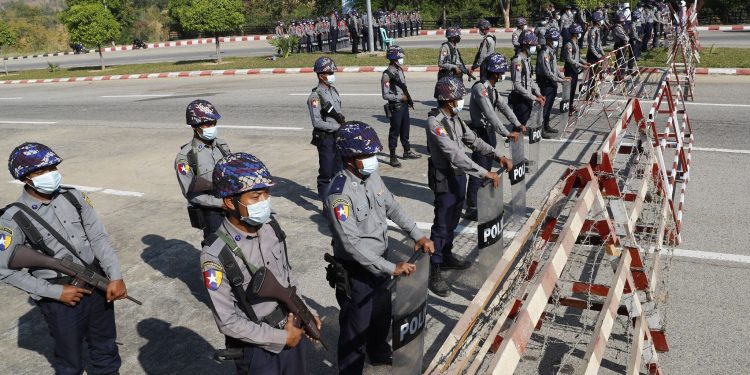There was panic-buying of food, military roadblocks in the capital Naypyidaw and a triumphant pro-army rally in Yangon in the hours after a coup in Myanmar.
But there was also quiet anger simmering among those whose hopes for the country’s democratic future have been stolen.
“It’s extremely upsetting — I don’t want the coup,” said a 64-year-old Burmese man in Hlaing township, standing with a crowd outside a grocery stall.
“I have seen many transitions in this country and I was looking forward to a better future,” he added, declining to provide a name for fear of repercussions.
A putsch had been expected for days, yet when it came it left Myanmar stunned — with roads to its main international airport blocked and communications cut — a country once more isolated from a world it only rejoined a decade ago.
The military detained de facto leader Aung San Suu Kyi early on Monday — hours before a newly elected parliament dominated by her NLD party was expected to take its seats for the first time since November polls.
By 8:30 am (0200 GMT), a state of emergency was announced and former general Myint Swe appointed acting president — sinking the country back into direct military rule after barely a decade-long experiment with democracy.
Fear spread as internet and mobile services were pulled by authorities across the country.
In Yangon, Myanmar’s commercial capital, people rushed to their neighbourhood grocery stores to stock up on rice, oil and instant noodles as banks were temporarily closed by the communications freeze.
But aside from police, uniformed men were few and far between in the city, and no blood was shed.
The guns, tanks and helicopters were further north around Naypyidaw, where armoured vehicles blocked off major roads leading to parliament.
Dangerous times
Suu Kyi’s party won over 80 percent of parliamentary seats available — a seemingly unacceptable number to a military that still held key government posts, retained power over all defence and security decisions, and had 25 percent of seats ring-fenced for them.
Yangon filmmaker Lamin Oo said he was “shocked” but unsurprised after a week of coup rumblings.
“I take my chance to vote very seriously because this can happen in this country,” the 35-year-old told AFP, adding that his neighbourhood in Yankin Township was trying to stay calm.
“I think we need to be prepared for the worst.”
Truckloads of pro-military supporters were spotted driving through Yangon’s main roads, waving the country’s flag while blaring the national anthem in an apparent resounding approval for the putsch.
A small group gathered near the Martyrs’ Mausoleum in downtown Yangon dancing to music booming from loudspeakers blaring the lyrics “We have bravely shown Myanmar’s blood”.
Another pro-military protest near Sule pagoda saw local and foreign reporters beaten up, according to videos posted on Facebook.
“This is too much… and an act of injustice,” an MP for Suu Kyi’s National League for Democracy told AFP, requesting anonymity and explaining she was restricted in her official compound in Naypyidaw with scores of other lawmakers.
For weeks the military has raised allegations of voter irregularities, demanding the election committee release the voters’ list while army head Min Aung Hlaing made menacing statements about repealing the country’s constitution.
By Monday, the military announced a year-long state of emergency, promising to hold new “free and fair multiparty general elections” and hand over power at the end.
But the country — where pro-democracy protest movements have been crushed with army violence in the past — is on “a knife’s edge”, said independent analyst David Mathieson.
For the millions who voted for Suu Kyi’s party, they will be “enraged and fearful at a power grab that threatens to squander the gains of the past ten years.”










